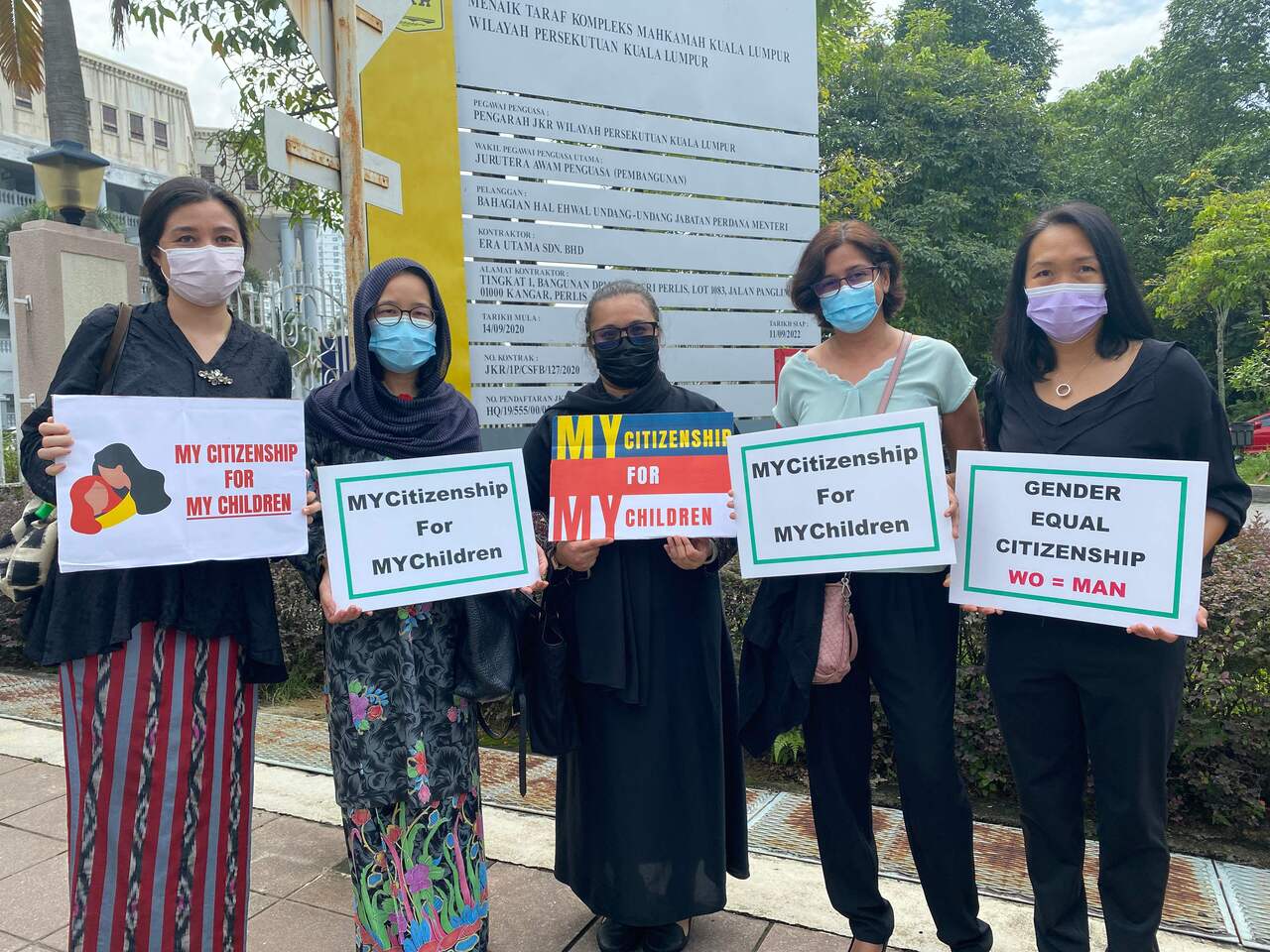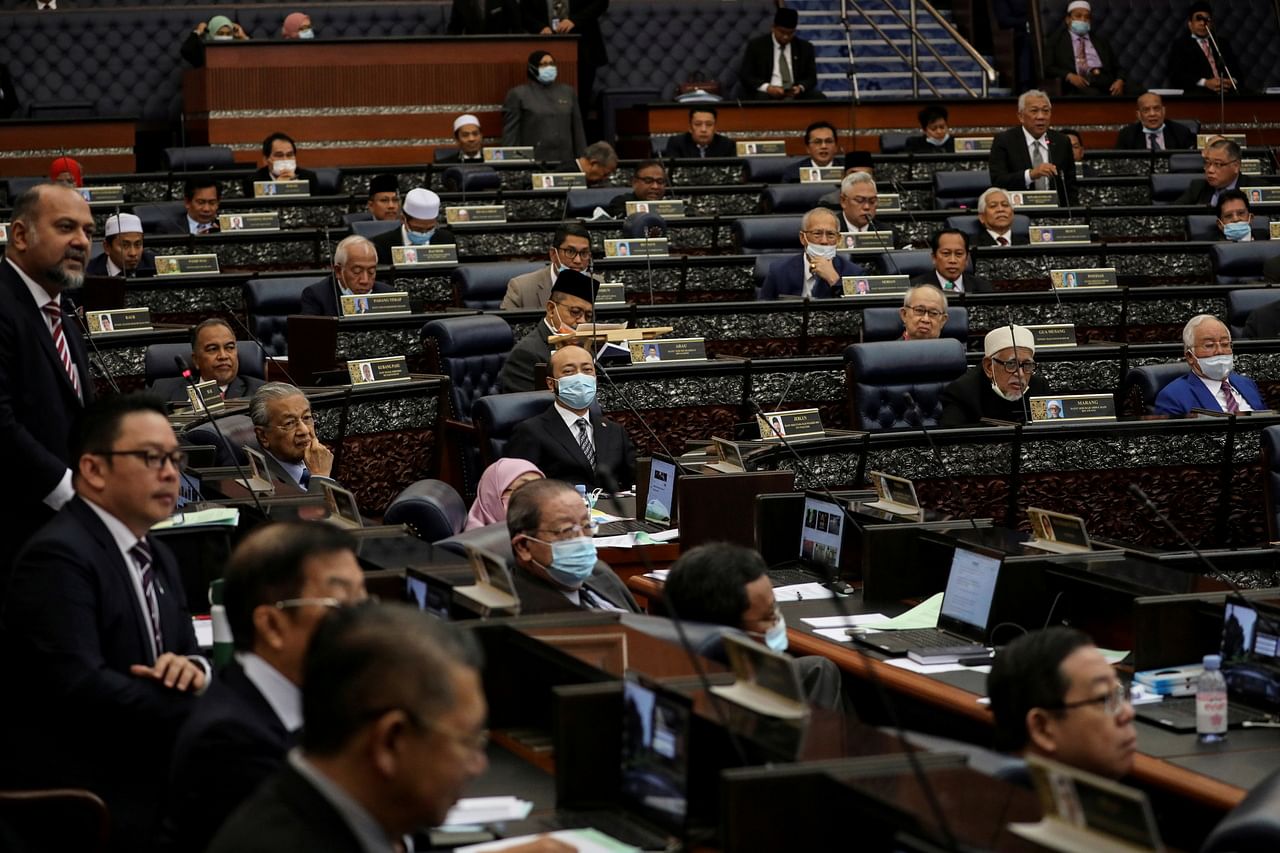Malaysian govt under fire for appealing against ruling permitting mums to pass on their citizenship to kids
Sign up now: Get insights on the biggest stories in Malaysia

Plaintiffs in the case posing outside the Kuala Lumpur High Court on April 27, 2021.
PHOTO: AFP
KUALA LUMPUR - The Malaysian government is being criticised by civil society organisations and one of its own Cabinet members for deciding to appeal against a landmark court ruling that equalised the rights of Malaysian mothers and fathers as regards the citizenship of their children who were born overseas.
The government filed a notice of appeal against the High Court ruling on Monday (Sept 13), cutting short the joy of six Malaysian mothers and hundreds of others represented by them who had hoped they would be able to transmit their citizenship to their overseas-born children with non-Malaysian fathers.
A petition urging the government to drop the appeal has garnered more than 10,000 signatures in just a day, while de facto Law Minister Wan Junaidi Wan Jaafar said he sympathised with the plight of Malaysian mothers and that he would bring up the matter to the Cabinet.
In a ruling last Thursday on a legal challenge mounted by the six mothers against the government, the High Court said that Malaysia's citizenship laws have to be read together with Article 8 (2) of the Federal Constitution, which prohibits gender discrimination, effectively equalising the rights of both mothers and fathers in passing on their Malaysian citizenship to their overseas-born children.
For years, Malaysian mothers with non-Malaysian spouses whose children were born overseas have had to apply to get citizenship for their children, a process with a very low approval rate of below 2 per cent.
Meanwhile, Malaysian fathers with overseas-born children are allowed to automatically pass on their citizenship to them.
This is due to provisions in Malaysia's citizenship laws that mention only the right of fathers to automatically transmit citizenship. No mention is made of mothers.
Malaysia is one of only 22 countries in the world to retain unequal citizenship laws affecting mothers. It is also one of only two in South-east Asia, the other being Brunei.
Despite a recent change in government, new Prime Minister Ismail Sabri Yaakob has retained Attorney-General Idrus Azizan Harun and Home Minister Hamzah Zainuddin - two key individuals who had previously attempted to throw out the suit by Malaysian mothers by branding the legal challenge as "frivolous".
The Home Ministry had argued in Parliament last year that the unequal citizenship law was a matter of "national security" aimed at preventing overseas-born children from gaining double citizenship, based on the assumption that children will be getting their father's citizenship.
The government's appeal came as a "shock" to Family Frontiers, a non-governmental organisation that has pursued lifting the disparity in citizenship laws since 2009. This was especially because the High Court ruling was also welcomed by two other federal ministers - Communications and Multimedia Minister Annuar Musa and also Women, Family and Community Development Minister Rina Harun.
"The government has opted to defend the status quo of the injustice that has been in place since Independence... Malaysian women have borne the injustice for 64 years," Family Frontiers said in a statement on Monday.
Family Frontiers started a petition against the government's appeal of the High Court's ruling on Monday, directed towards Datuk Seri Ismail and other key decision makers in the government - including Datuk Seri Hamzah. As at Wednesday, the petition is close to garnering 15,000 signatures.

Malaysia is one of only 22 countries in the world to retain unequal citizenship laws affecting mothers.
PHOTO: REUTERS
Before the legal challenge was initiated, Family Frontiers and affected mothers had attempted to look for a political solution to the issue. However, an amendment to the Federal Constitution requires a two-thirds majority backing, meaning bipartisan cooperation is necessary to amend the provisions.
Former deputy women, family and community development minister Hannah Yeoh spoke on the issue during Pakatan Harapan's administration, but no meaningful change took place. The home minister during the PH administration was Tan Sri Muhyiddin Yassin, who would subsequently lead a mass defection to form the Perikatan Nasional government in early 2020.


